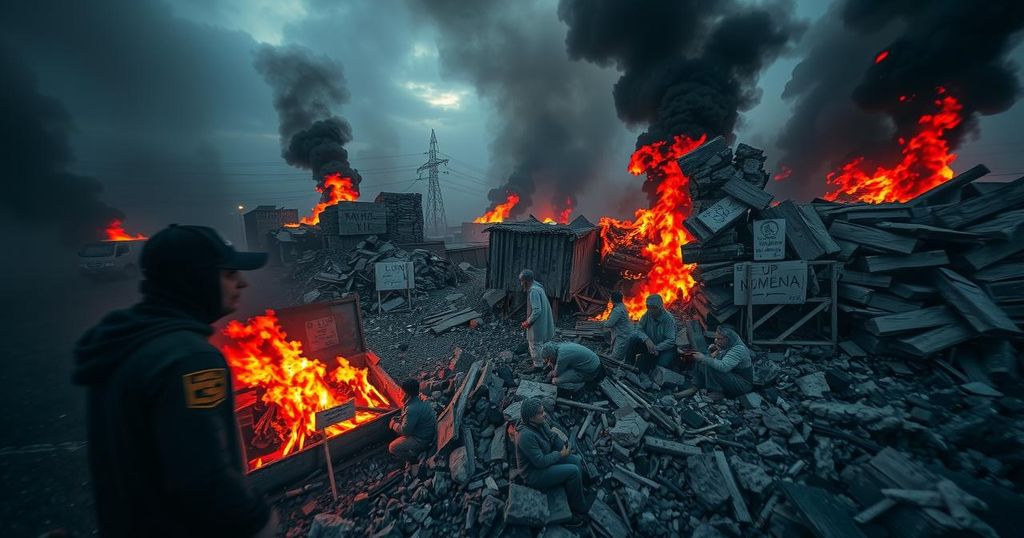Escalating Violence in Gaza and Lebanon: A Critical Humanitarian Crisis

The Gaza conflict has entered its 379th day, with Israeli forces intensifying military operations, particularly in the Jabalia camp, resulting in considerable civilian casualties. Global leaders have called for a ceasefire amidst escalating violence and humanitarian crises, as tensions also persist in Lebanon with military actions from Hezbollah and Israeli responses. The situation remains critical as the international community emphasizes the need for urgent humanitarian aid and conflict resolution.
The ongoing conflict in Gaza has now reached a somber milestone, marking its 379th day, as Israeli military operations escalate in the region, particularly in the Jabalia refugee camp. This recent increase in assaults has led to tragic casualties among civilians, predominantly women and children, with a recent airstrike resulting in numerous fatalities. The Israeli military, having intensified its air and ground operations in northern Gaza, has maintained a siege in the Jabalia camp for over two weeks. The deployment of the Givati Brigade, alongside the 162nd Division, signifies a potential escalation of military activities. According to the Gaza Ministry of Health, the occupation forces have been responsible for what they declare to be three massacres in the Strip recently, resulting in 19 deaths and 91 injuries, raising the overall death toll to over 42,519, alongside 99,637 injuries since October 7, 2023. Reports indicate that communications in northern Gaza have been disrupted, interpreted by Hamas as a tactic to isolate civilians and obscure the actions of the occupation forces. Thousands of Palestinians have chosen to stay in their homes within the Jabalia camp, defying evacuation orders despite the ongoing ground attacks. In a significant political development, the Islamic Resistance Movement (Hamas) announced the assassination of its leader, Yahya Sinwar. Concurrently, global leaders including the American President, French President, German Chancellor, and British Prime Minister have called for a ceasefire in the conflict following a meeting in Berlin, emphasizing the urgency of facilitating humanitarian aid and the return of Israeli hostages. Additionally, Michael Fakhri, the UN’s independent food rights investigator, stated that Israel continues its “starvation campaign” against Gaza. This is despite the dispatch of over a million tons of aid to the region since the conflict began. On the military front, the Al-Quds Brigades destroyed an Israeli military vehicle using an explosive device, while Hamas’s Qassam Brigades targeted a military bulldozer and a Merkava tank with explosives. In the broader context of regional tensions, the Israeli military intercepted drones launched from Lebanon, signaling an escalation of cross-border confrontations. Hezbollah has claimed responsibility for multiple missile attacks on Northern Israel, escalating the confrontational stance. Meanwhile, Israeli airstrikes have continued in Lebanon, particularly in southern regions, with Lebanese Prime Minister Najib Mikati emphasizing the necessity of a ceasefire and denouncing attacks on civilians. He has explicitly stated Lebanon’s commitment to international resolutions, particularly Resolution 1701, urging for strengthened military presence in southern Lebanon to maintain order against Israeli provocations.
The Gaza conflict has persisted with heightened military engagement and severe humanitarian implications. The ongoing hostilities have tragically resulted in widespread civilian casualties and significant international concern regarding the methods used during military operations. The siege conditions in specific areas have compounded the humanitarian crisis, drawing global appeals for ceasefire and humanitarian assistance. Furthermore, the regional implications of Israeli actions in Gaza extend to Lebanon, where conflicts have flared due to military skirmishes involving Hezbollah and the Israeli Defence Forces. The international community continues to call for an urgent resolution amid increasing violence.
In conclusion, the situation in Gaza and Lebanon remains dire as military operations intensify, leading to significant civilian casualties and international outcry for a ceasefire. The complexities of the conflict, highlighted by the humanitarian crisis and regional spillover effects, necessitate urgent diplomatic efforts to alleviate suffering and work towards a peaceful resolution. The acknowledgment by global leaders of the need for humanitarian aid and the resolution of underlying conflicts presents a critical step toward potential de-escalation.
Original Source: www.dailynewsegypt.com








